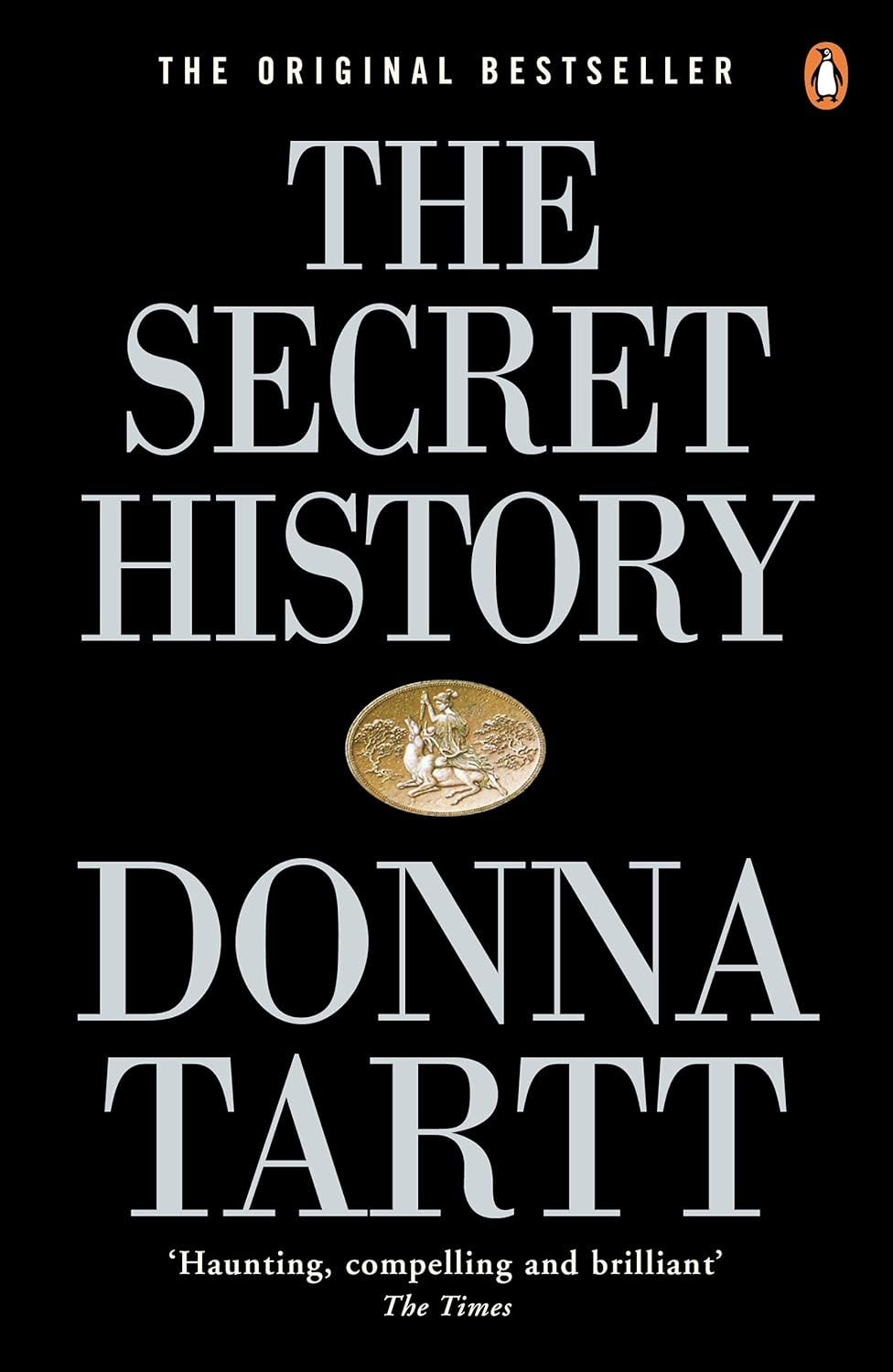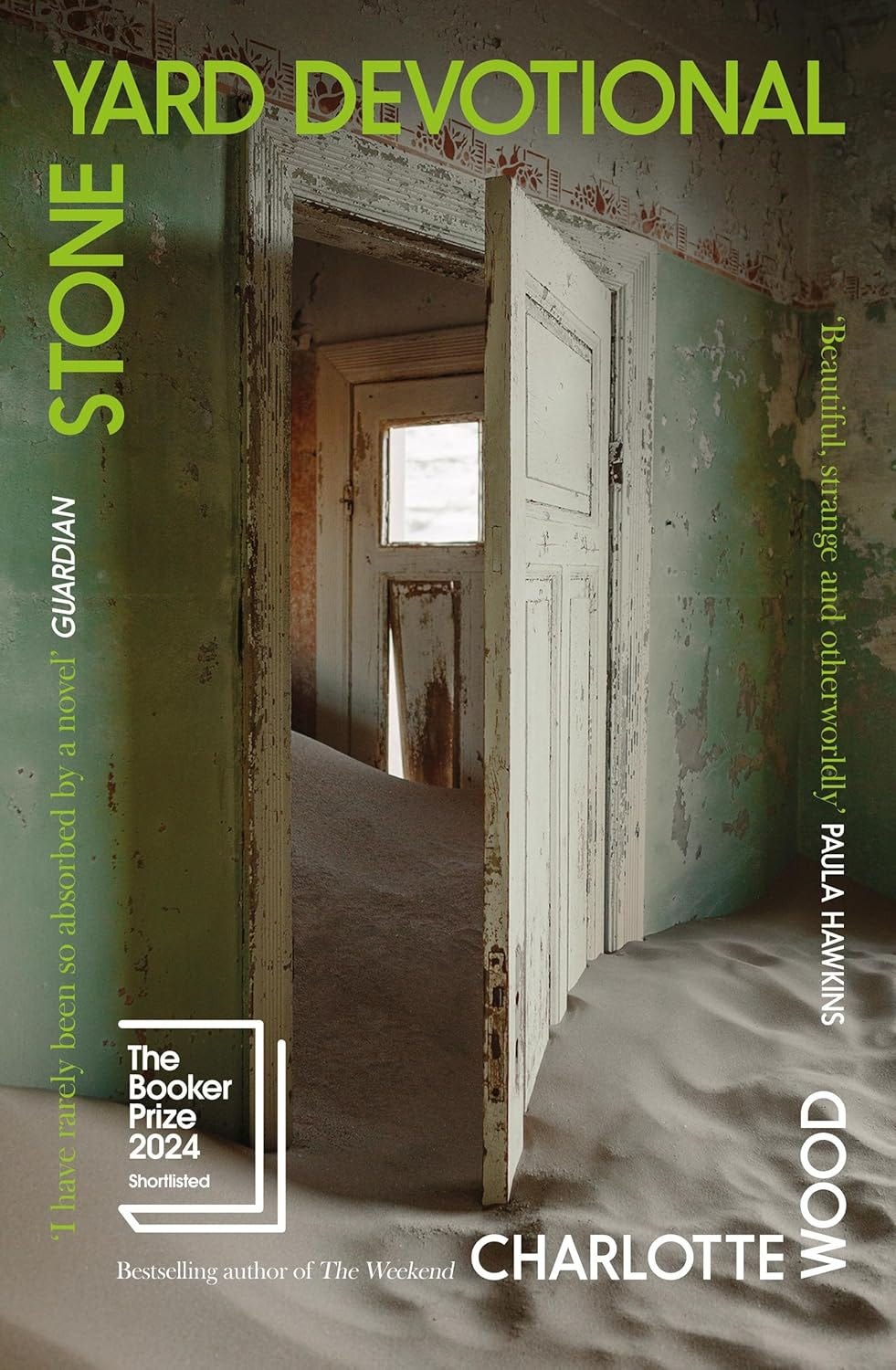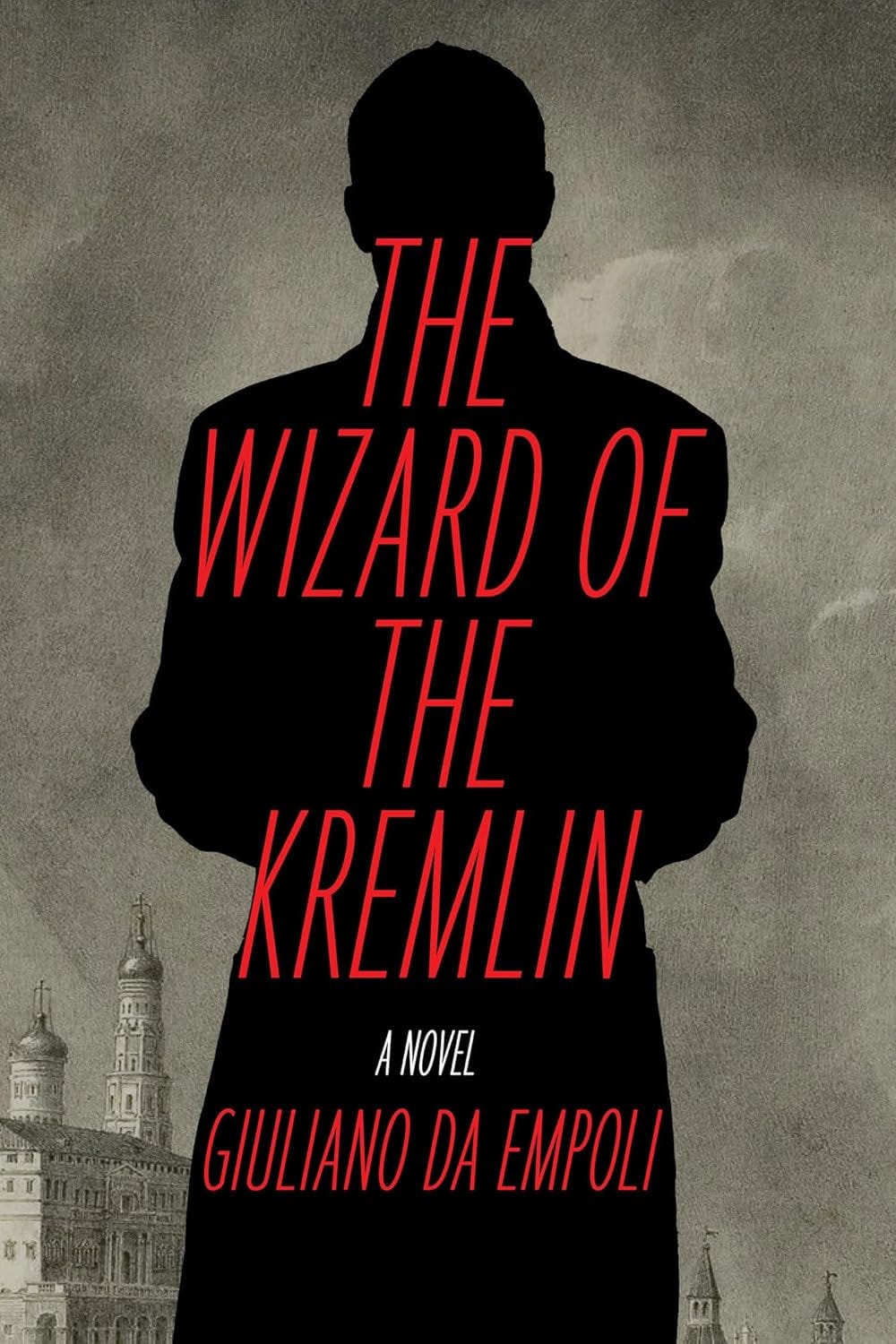Good morning!
This past week, I read three fiction books: The Secret History by Donna Tartt (a psychological thriller that focuses on a group of classics students at a small liberal arts college in Vermont in the 1980s), Stone Yard Devotional by Charlotte Wood (a literary fiction work about a woman living in a nunnery on the plains of Australia), and The Wizard of the Kremlin by Giuliano da Empoli, translated from French by Willard Wood (a fictional imagining of Putin’s inner circle).
I really enjoyed The Secret History and The Wizard of the Kremlin but felt more mixed on Stone Yard Devotional, which was shortlisted for last year’s Booker Prize. Let’s get into it.
read📖→
The Secret History by Donna Tartt
The Secret History is Donna Tartt’s first novel (published in 1992) that focuses on classic students at a small Vermont liberal arts college in the 1980s.
Overview: The Secret History is narrated by Richard Papen, a scholarship student from California. The novel opens with a murder: “The snow in the mountains was melting and Bunny had been dead for several weeks before we came to understand the gravity of our situation.” Papen is now twenty-eight years old and tells the story of his time at Hampden College leading up to Bunny’s murder.
In college, Papen spent his meager funds buying vintage designer clothes and tried to erase his past—he told his fellow students that his family’s wealth came from “oil,” when his father actually worked at a gas station. Papen joined a small group of classics majors to study ancient Greek. The students took nearly all of their classes with the eccentric professor Julian Morrow, who also served as their academic mentor. As Tartt writes:
His students—if they were any mark of his tutelage—were imposing enough and different as they all were they shared a certain coolness, a cruel, mannered charm which was not modern in the least but had a strange cold breath of the ancient world; they were magnificent creatures, such eyes, such hands, such looks—sic oculos, sic ille manus, sic ora fere bat.
Papen slowly befriended the cult-like group of students: Henry Winter, a wealthy student from St. Louis who translated Paradise Lost into Latin; Camilla and Charles Macaulay, the beautiful twins from Virginia; Bunny Corcoran, Henry’s best friend from New York who perpetually borrowed money from the others, and Francis Abernathy, a hypochondriac from Boston. Tartt follows the group through their studies and weekends in the countryside. The story gradually becomes darker and more twisted.
Opinion: Unless you’ve been living under a rock since 1992, you’ve probably heard of The Secret History. It’s become popular again in the past few years after the 30th anniversary edition was released. I read it back in high school but could barely recall the plot, so I was excited to re-read it with my book club this month. This book lives up to much of its hype—it is incredibly well-written with atmospheric prose. Tartt captures the changing scenery of Vermont, weaves in countless literary references, and throws in dark plot twists.
For me, the literary references are what make this book unique. Usually, I would write a lengthy analysis of these references, but I found this Substack post from Bookish Naomi that did a great job of that already. Some readers might be put off by the allusions to Plato and Aeschylus and the time the characters spend translating ancient texts. I personally loved this, but I love all things Greek and Roman.
While I really enjoyed this book, it’s not perfect. The male characters blurred together for me, and Camilla felt particularly flat. However, I suspect Camilla’s character sketch was intentional, since Richard narrates the novel and thus our view is limited by what he knows about Camilla. The plot was also slow at times. I realize this isn’t a classic whodunit, but I wished the murder happened a bit later in the novel, as opposed to the halfway point. The last part of the novel was somewhat meandering.
Overall: Minor criticisms aside, I definitely recommend this book. It’s a great fall or winter dark academia read!
Rating: 4/5
Genre: Historical Fiction (Thriller/Mystery)
Page count: 559 pages
Audio: 22 hours 3 minutes (note this is an older recording—a few of my friends abandoned the audiobook)
Movie/TV pairings: Twin Peaks; The Riot Club; Dead Poets Society; School Ties; The Talented Mr. Ripley
Stone Yard Devotional by Charlotte Wood
Stone Yard Devotional is a literary fiction work that centers on a woman living in a nunnery in Australia.
Overview: The unnamed narrator of Stone Yard Devotional is a middle-aged woman who has left her husband and job at the Threatened Species Rescue Center. She plans to spend five days at a monastic religious community on the plains of Australia near her childhood home: “I had a need, an animal need, to find a place I had never been but which was still, in some undeniable way, my home.”
Although the narrator was raised Catholic, she is an atheist who bemoans the “savagery of the Catholic Church” and dismisses the scriptures as “biblical mumbo jumbo.” To her surprise, she decides to stay at the nunnery with eight nuns on a semi-permanent basis. Her days are filled with cleaning, preparing food, gardening, singing, and praying with the nuns. She finds solace in prayer: “It’s not an interruption to the work, it is the work. This is the doing.” She is also moved by Communion: “It has to do with being greeted warmly by a stranger, offered peace for no reason, without question.”
There is no traditional plot, but a few things happen at the austere community. She interacts with a student from her old high school, Richard Gittens, who helps out at the nunnery. The skeletal remains of a nun from the community who was murdered while working in Thailand are also returned to Australia. While working, the narrator has flashbacks to her childhood and thinks about her mother’s death. As her memories multiply, a bewildering mouse plague takes over the nunnery and her hometown: “The mouse plague is infecting everything now: all sense of smell, of course, but even sound, even memory.”
Opinion: I chose to read Stone Yard Devotional because it was shortlisted for last year’s Booker Prize. This book is well-written in crisp, sparse prose. While we know very little about the narrator, it reads like an intimate confessional. However, the plot is relatively slow-moving, and the flashbacks sometimes seem out of place. Some of the narrative threads tie together at the end of the book, but Wood leaves many questions unanswered.
I feel the same way about Stone Yard Devotional as I did about Anne Michaels’s Held, which was also on the 2024 Booker shortlist. It’s well-written and made me reflect on forgiveness and death, but it was a little too abstract and plotless for me.
Overall: I didn’t hate this, but I probably won’t think too much about this book again or recommend it.
Rating: 3.4/5
Genre: Literary fiction
Notable prizes/book clubs/lists: Shortlisted for the Booker Prize (2024)
Page count: 320 pages
Audio: 6 hours 37 minutes
The Wizard of the Kremlin by Giuliano da Empoli, translated from French by Willard Wood
The Wizard of the Kremlin is a fictional imagining of Putin’s inner circle.
Overview: The novel opens with an unnamed narrator, a French journalist, visiting Moscow to research writer Yevgeny Zamyatin. The journalist meets Vadim Baranov, a fictional character who is closely based on Putin advisor Vladislav Surkov. Baranov and the journalist begin talking because of their mutual interest in Zamyatin. Baranov’s voice then takes over the novel and the rest reads like his confessional monologue.
Baranov explains his role in Putin’s rise to power and efforts to restore sovereign Russia under authoritarian rule. He uses his personal life and background to explain the political history of twentieth-century Russia. Russia’s fate has always been “to be governed by the descendants of Ivan the Terrible.” The focus is on the “tsar,” which is what he calls Putin, and the “power base is at court.” In Putin’s inner circle, “adulation is more effective than talent.”
Baranov also delineates the differences between Russia and the West. For example, in America, billionaires are untouchable. In Russia, wealth can be taken away, like when Putin arrested Mikhail Khodorkovsky and seized his company. As Baranov explains: “Now, it’s clear that you in the West, living hypocritically, think that power, vigor, force, are a bit archaic. You believe in rules, with your lawyers communicating by certified mail and earning million-dollar fees.”
Opinion: Da Empoli served as an advisor to Italian Prime Minister Matteo Renzi. The Wizard of the Kremlin was published shortly after the Ukraine invasion and was well-received in France. It was the fifth best-selling book in France in 2022.
I enjoyed da Empoli’s writing style; it reminded me of Umberto Eco’s prose. The characters also felt realistic, and I read this book relatively quickly. That said, this book has its critics, who have argued that it indulgently portrays Putin as fighting against the West and “putting Russia back on its feet.” I personally didn’t get that impression from the book, but I could see it reinforcing a different viewpoint.
Overall: I enjoyed this and would recommend it to someone wanting to read another perspective on modern Russia!
Rating: 4/5
Notable book clubs/prizes/lists: Académie Française Prize (2022)
Genre: Fiction (Political Thriller)
Page count: 297 pages
Audio: 6 hours 36 minutes
consumed 🎬🎧🗞️→
One of my friends got picked to serve on a jury, so we were talking about this show—everyone is an actor except for one man. It’s one of the more original shows I’ve seen in a while.
I admit that I can’t look away from all of the Sussex pet projects. I watched a few episodes of Meghan’s new Netflix show—With Love, Meghan—while I cooked this week. It’s incredibly boring, and I’m not quite sure what she’s trying to do here. This (savage) Vulture article sums up a lot of my thoughts on the show:
Netflix’s new reality series With Love, Meghan is a testament to the simple but powerful reminder that two things can be true at the same time. Meghan Markle (Meghan Sussex!) is a perfectly regular human woman who stumbled into a romance with a prince and then found herself at the center of a tornado of bullshit fueled by predatory British tabloids; a centuries-old monarchal tradition shaped by imperialism and snobbery; and basic, ugly racism. All of it was cruel and surreal — no one could ever deserve the way she was treated — and Harry and Meghan’s decision to leave the royal family is courageous. All of this is one sincere and complicated reality of Meghan Markle’s public persona.
The other truth is that With Love, Meghan is an utterly deranged bizarro world voyage into the center of nothing, a fantastical monument to the captivating power of watching one woman decorate a cake with her makeup artist while communicating solely through throw-pillow adages about joy and hospitality. It is painfully defensive. Meghan comes across as constantly worried about what people will think, and because of it, the show can neither flaunt her unusual life, nor can it embrace legitimate ordinariness. It is at once wildly unattainable, like when she describes the joys of sourcing beeswax from your local beekeeper, and mind-bogglingly basic, as in building a whole segment out of arranging fruit in rainbow order. And it is quite, quite sad — a document created by a woman cursed to a life in which even the safest, blandest, emptiest statements somehow boomerang back around toward cuckoo land.
A photographer captured a twenty-minute fight between a goose and a bald eagle.
cooked 🍳→
Chicken soup with avocado and lime.
Hong shao rou, Peking duck, and Chinese greens.










I was wondering whether to read Stone Yard Devotional, however, like you I have read Anne Michael’s Held, and found there was something definitely lacking. With so many books I want to read, I will give Stone Yard a miss. I’m a fan of The Secret History though - and my favourite book is Tartt’s The Goldfinch.